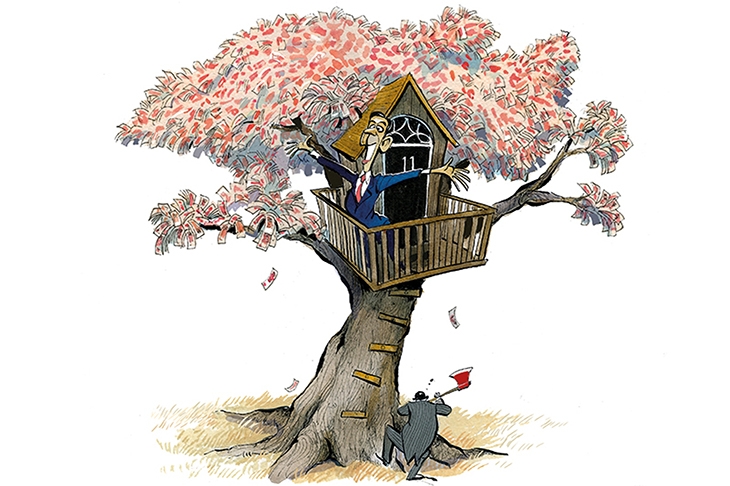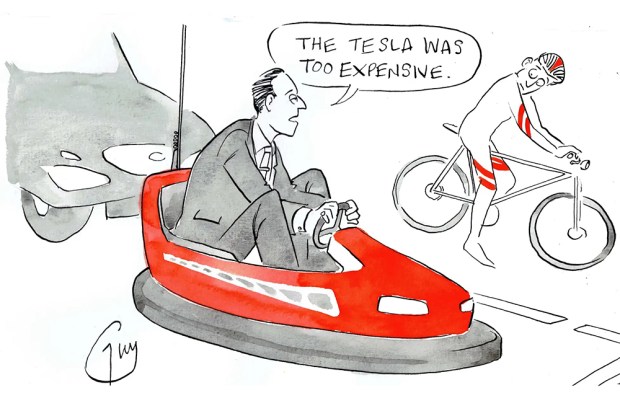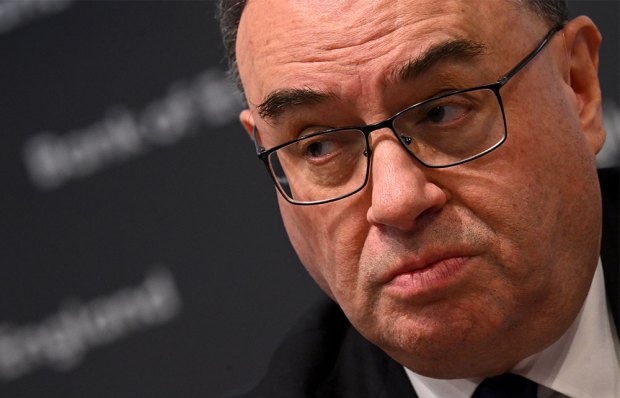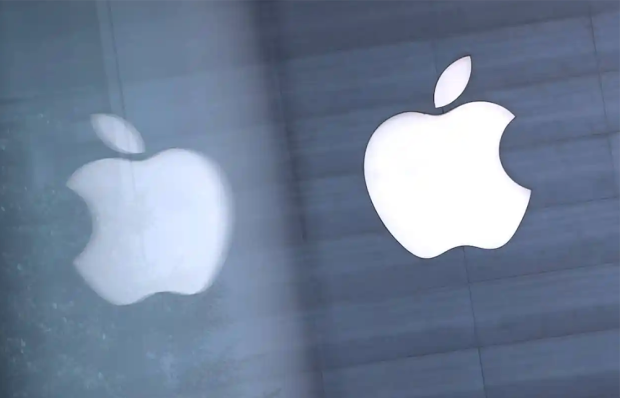Will my bath water still be hot by Christmas? That’s not a question I’d normally feel a need to share with you, but shortly after this morning’s ablutions I read that Bulb Energy — the UK’s sixth-biggest energy supplier with 1.7 million customers, including me — ‘is seeking a bailout to stay afloat amid surging wholesale gas prices’.
The spike in the global gas-price graph is extraordinary, up 250 per cent since the start of 2021 and steeper in August. It has many causes beyond our shores, including depletion of stocks last winter, restricted supplies from Russia, hurricane-hit US refineries and increased Asian demand post-Covid. But as this column has long argued, decades of policy dither by successive governments has left the UK peculiarly vulnerable in terms of energy security, and suddenly we see what that means in reality.
In summary, we import, from Norway or the Gulf, two-thirds of the natural gas we still need to generate 35-40 per cent of our electricity, while under-exploiting our own remaining reserves in the North Sea and onshore. Unlike European neighbours, we lack bulk storage for gas. Several of our nuclear reactors are currently shut for maintenance and the ‘interconnector’ in Kent that lets us buy electricity from France has been closed by fire. Summer winds have been too soft to turn the offshore turbines of which ministers are so proud.
Result: energy suppliers are trapped between soaring wholesale prices and Ofgem’s cap on rises for consumers. Many, including Bulb, could go bust if government does not save them. So what next? Should ministers revert to pandemic ‘whatever it takes’ mode, borrowing and subsidising without limit until global prices fall back again? Or let market forces rip? A massacre of energy companies combined with punitive winter fuel bills on top of spikes in many other prices won’t be a good look for our eager-to-please Prime Minister. Stand by for another hang-the-consequences shaking of the magic money tree.
Beware Evergrande
Two of the most overused clichés in financial commentary are ‘perfect storm’ — an unusual combination of adverse factors, as in the current energy crisis — and ‘black swan’, which (according to author Nassim Nicholas Taleb) is an unexpected, one-off event causing far-reaching economic damage. Currently flapping its feathers in the latter category is Evergrande, the Chinese property giant founded by billionaire Hui Ka Yan that’s in danger of defaulting on $300 billion of debts — including bonds held by domestic and foreign investors, loans from 300 Chinese lenders and ‘wealth management’ products sold to the Chinese public.
If Xi Jinping allows Evergrande to collapse, the ramifications for his country’s ill-regulated financial system could be huge, and international markets will shudder. What may stir Beijing to intervene is the risk, more feared by the ruling communist elite than any financial disruption, of social unrest: angry investors and homebuyers have already besieged Evergrande’s offices.
But a slump in China’s real estate and construction sector — which veteran China–watcher Fraser Howie says has been ‘red-hot for 25 years’ — is more of an inevitability than a swan of any colour. And it might offer another useful cliché, the silver lining: a downturn in Chinese GDP growth and associated commodity demand could be a deflationary vaccine shot for a world that’s fighting a nasty outbreak of inflation.
A job for Jesse
Why is Jesse Norman out of government? Sacked as financial secretary to the Treasury in last week’s reshuffle — allegedly to make the government look more diverse, possibly because Treasury officials found him too bumptious — the live-wire MP for Hereford, whom I’ve known since he was a bright young banker 30 years ago, surely needs another challenge even if he says he doesn’t. He’s held ministerial posts in transport and industry as well as finance — and bearing in mind my remark last week about the unjoined-up, on-off nature of schemes to help the start-up ventures that are so vital to economic recovery, there’s an obvious Downing Street vacancy for someone to pull all that together and put some fireworks behind it. Bring on the Enterprise Tsar.
An original mind
Sir Clive Sinclair, the inventor who died last week, took more stick for the comic failure of his underpowered C5 electric vehicle than he ever received praise for the ZX Spectrum personal computer which was briefly a world leader in the electronics market of the 1980s. It wasn’t his fault that the UK offered (then and arguably still) such paucity of patient capital and tech-literate networks to support an original mind like his — and it’s surprising in retrospect that he never packed his bags and moved to California.
Instead, on the verge of bankruptcy in February 1986, he avoided a proffered ‘rescue’ by Robert Maxwell and opted instead to sell his brand name and intellectual property to Alan Sugar’s Amstrad company. That conjures a vision of Sinclair as a hapless contestant on The Apprentice, bald pate gleaming under the lights as he tries to explain the workings of his product to the impatient tycoon — who is said to have replied, when this conversation happened in real life: ‘I don’t care if they have rubber bands in them, as long as they work.’
The problem was that Sinclair’s devices quite often didn’t work. But the deal went through after a hitch in which (says Sugar’s autobiography) ‘some bloody hippy’ who had written the source code for the Spectrum’s vital microchip had to be tracked down fishing in Cambridgeshire on a bank holiday and paid £20,000 for his rights. A rapidly redesigned Amstrad Sinclair model went into production in a Taiwanese factory and 300,000 were sold by Christmas. As Sugar wrote: ‘You won’t find a story like that in the Harvard Business School manual.’
Got something to add? Join the discussion and comment below.
Get 10 issues for just $10
Subscribe to The Spectator Australia today for the next 10 magazine issues, plus full online access, for just $10.
You might disagree with half of it, but you’ll enjoy reading all of it. Try your first month for free, then just $2 a week for the remainder of your first year.















Comments
Don't miss out
Join the conversation with other Spectator Australia readers. Subscribe to leave a comment.
SUBSCRIBEAlready a subscriber? Log in